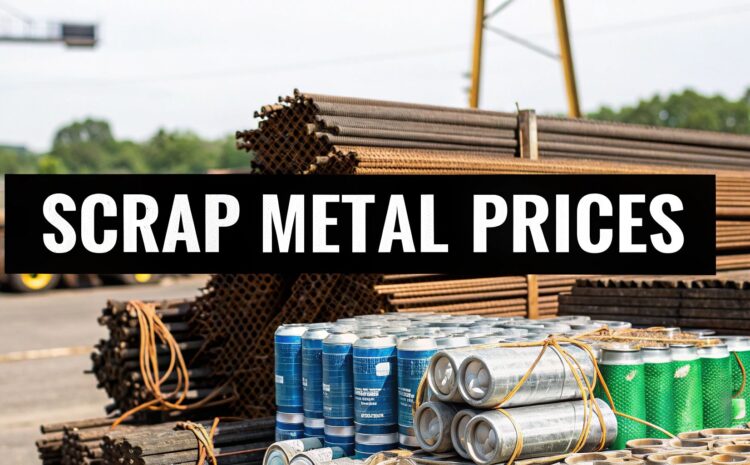
Current Price of Scrap Metal Per Ton UK | 2024 Guide
The price you'll get for scrap metal per ton in the UK can swing wildly. A pile of light iron might only bring in £100-£130, while higher-grade HMS 1/2 steel could fetch £140-£170. But get your hands on premium non-ferrous metals, like bright copper wire, and you could be looking at over £6,000. Of course, these are just ballpark figures; the actual price you're paid changes daily, depending on global markets, where you are in the country, and the quality of your scrap.
Your Guide to Current UK Scrap Metal Prices
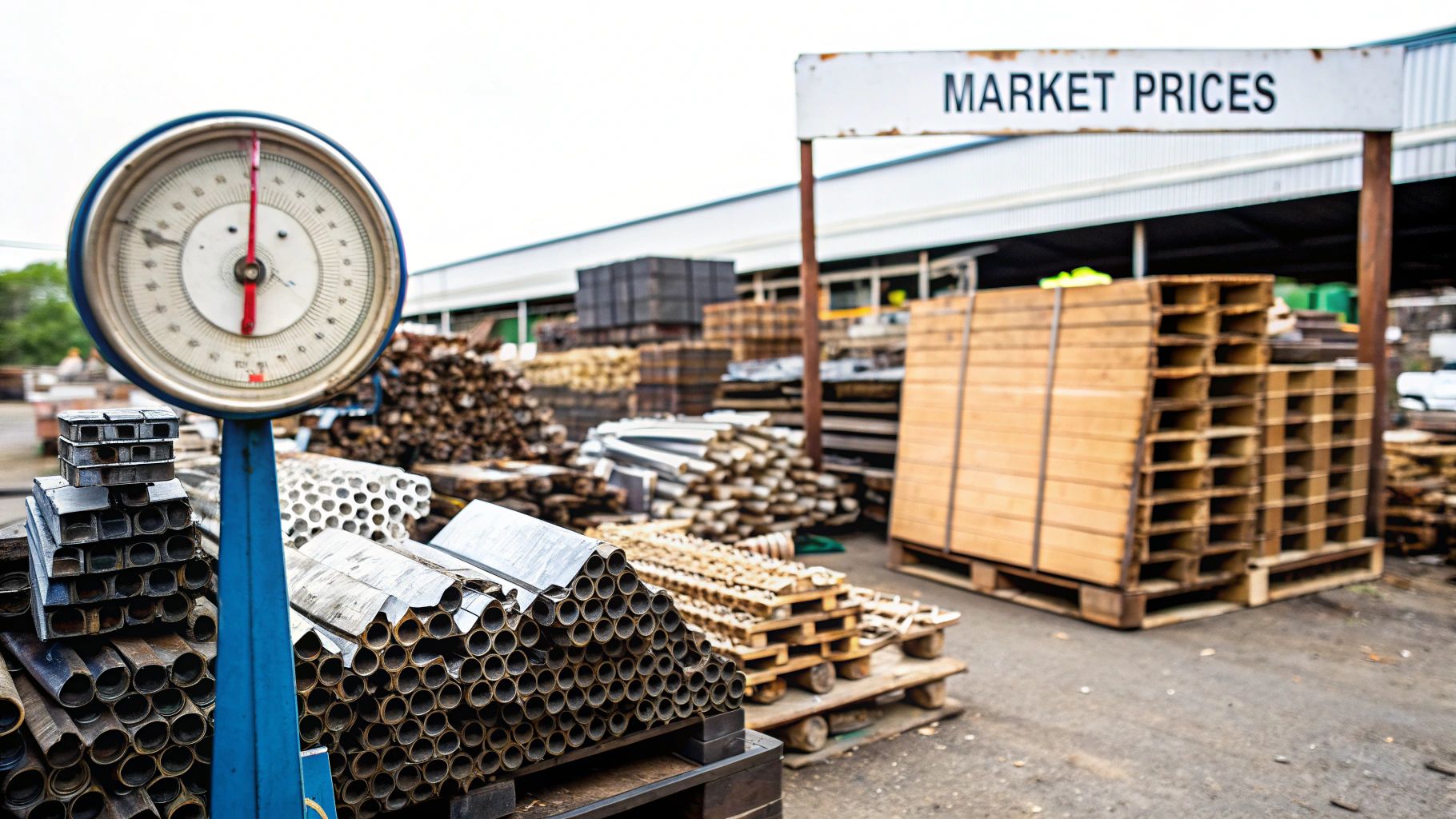
If you have a pile of scrap metal to sell, the first and most important step is figuring out what it's actually worth. Getting a fair price starts with understanding the market.
Think of it less like selling old furniture and more like trading on the stock market. Scrap metal is a global commodity, and its value is constantly in flux. The prices you see one day can be completely different the next, pushed and pulled by everything from construction booms in Asia to local energy costs right here in the UK.
To put it in perspective, let's look at some real-world rates. As of mid-2024, many yards in the South East—covering areas like London, Surrey, Slough, and Reading—were publishing prices that put heavy iron scrap at around £140 per tonne and mixed metals closer to £125. Scrap cars, or End-of-Life Vehicles (ELVs), were going for about £85 per tonne, a lower figure that reflects their mix of different metals and materials. You can often learn more about regional metal prices by checking what local yards are paying.
Ferrous vs Non-Ferrous: The Most Important Distinction
When it comes to sorting your scrap, there's one question that trumps all others: is it ferrous or non-ferrous? The answer to this simple question has the single biggest impact on the price you'll get.
- Ferrous Metals: These are the common metals that contain iron, which means a simple magnet will stick to them. Think of the steel and cast iron from old washing machines, car parts, and construction beams. They’re plentiful, which means their value is lower.
- Non-Ferrous Metals: This is where the real money is. These metals don't contain iron and aren't magnetic. This group includes high-value materials like copper, aluminium, brass, and stainless steel. Taking the time to separate these from the main pile is absolutely crucial for getting the best payout.
The golden rule of scrapping is simple: a mixed pile of metal is always valued at the rate of its lowest-grade component. By sorting your materials, you ensure each metal is weighed and paid for based on its true, higher value.
Indicative Scrap Metal Prices Per Ton in the UK
To give you a practical starting point, the table below provides an overview of current estimated price ranges for common types of scrap metal. These figures are a general guide for the UK, including key areas like London, Harrow, and Guildford.
Indicative Scrap Metal Prices Per Ton in the UK
| Metal Type | Category | Estimated Price Range per Ton |
|---|---|---|
| Heavy Melting Steel (HMS 1/2) | Ferrous | £140 – £170 |
| Light Iron / Shearing Steel | Ferrous | £100 – £130 |
| Cast Iron | Ferrous | £150 – £180 |
| Clean Aluminium | Non-Ferrous | £800 – £1,100 |
| Bright Copper Wire | Non-Ferrous | £6,000 – £6,800 |
| Brass | Non-Ferrous | £3,500 – £4,200 |
| Stainless Steel | Non-Ferrous | £1,000 – £1,300 |
Just remember, these are guide prices. For the most accurate and up-to-date rates, it’s always best to ring your local scrap yard and confirm directly with them.
What Drives Scrap Metal Prices
Ever wondered why you got one price for your scrap last month and a completely different one today? It’s a common question. The best way to think about it is to compare the scrap metal market to the stock market—its value is always on the move, pushed and pulled by the powerful forces of global supply and demand.
Getting your head around these factors is the key to understanding why the price of scrap metal per ton in the UK can feel so unpredictable.
At its heart, the value of scrap is directly linked to the demand for new products. If a construction boom kicks off in Asia, for instance, it creates a massive appetite for steel. That surge in demand can ripple all the way back to your local yard in London, pushing prices up. On the flip side, a slowdown in global car manufacturing means less demand for aluminium and steel, which will almost certainly cause prices to drop. These aren't just abstract economic ideas; they have a real, immediate impact on the quote you get at the weighbridge.
Beyond what’s happening in manufacturing, a few other key things influence the day-to-day prices. The strength of the British Pound against other currencies plays a huge part, especially since the UK is a major exporter of scrap metal. When the Pound is strong, our scrap becomes more expensive for international buyers. This can dampen their demand and, in turn, lower the prices offered here at home.
The Ripple Effect of Economic Forces
Energy costs are another massive factor, and their impact is felt right across the industry. Recycling metal is an energy-guzzling process. Firing up a furnace to smelt steel or melt down aluminium takes a colossal amount of electricity.
When UK energy prices climb, the running costs for recycling facilities go up with them. This extra expense has to be absorbed somewhere, and it's often passed down the line, leading to lower prices being offered for raw scrap.
Put simply, it becomes more expensive for the yard to turn your old washing machine into new steel sheets, and that cost is reflected in what they can afford to pay you. It’s why something that seems totally unrelated, like global gas prices or UK energy policy, can end up hitting your wallet.
The infographic below shows how the average price for mixed scrap can change from one region to another, reflecting these local economic pressures like transport costs and demand.
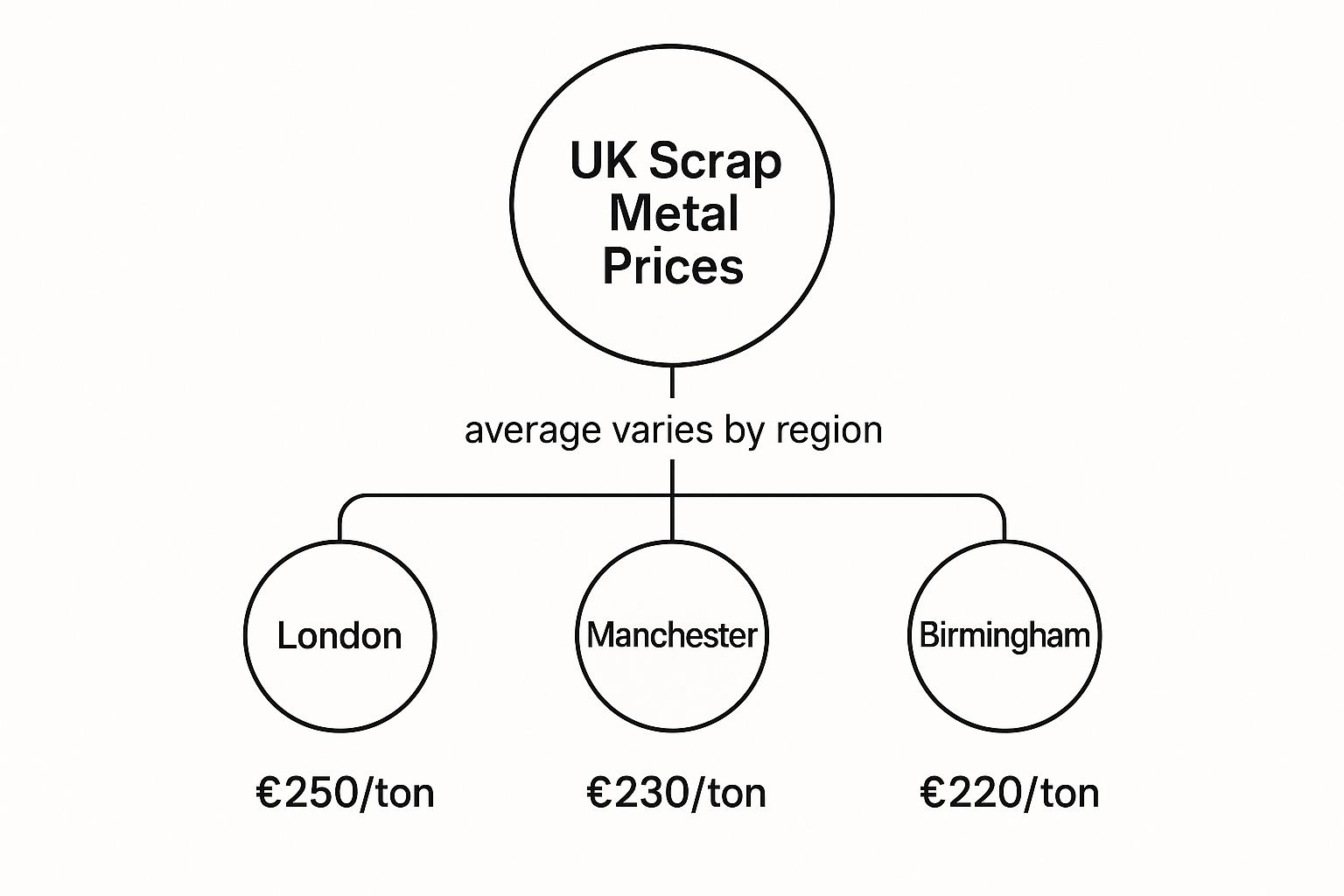
As you can see, major cities with lots of industrial activity and good transport links, like London, often fetch slightly better prices than more remote areas.
Local Competition and Demand
While global trends set the general price level, it's the local market that determines the final figure you're offered. The number of scrap yards in your area and how much they compete for business can really work in your favour. A yard in a competitive spot might offer better rates just to win your business.
Your location also plays a role in transport costs. A scrap yard in a rural area has to pay more to haul processed metal to steel mills or shipping ports, and that extra cost can eat into the prices they can pay out. That’s why being close to industrial centres and major transport routes often means you'll get slightly better rates. This is precisely why it always pays to ring around a few local yards before you load up the van.
Understanding Ferrous Metal Prices
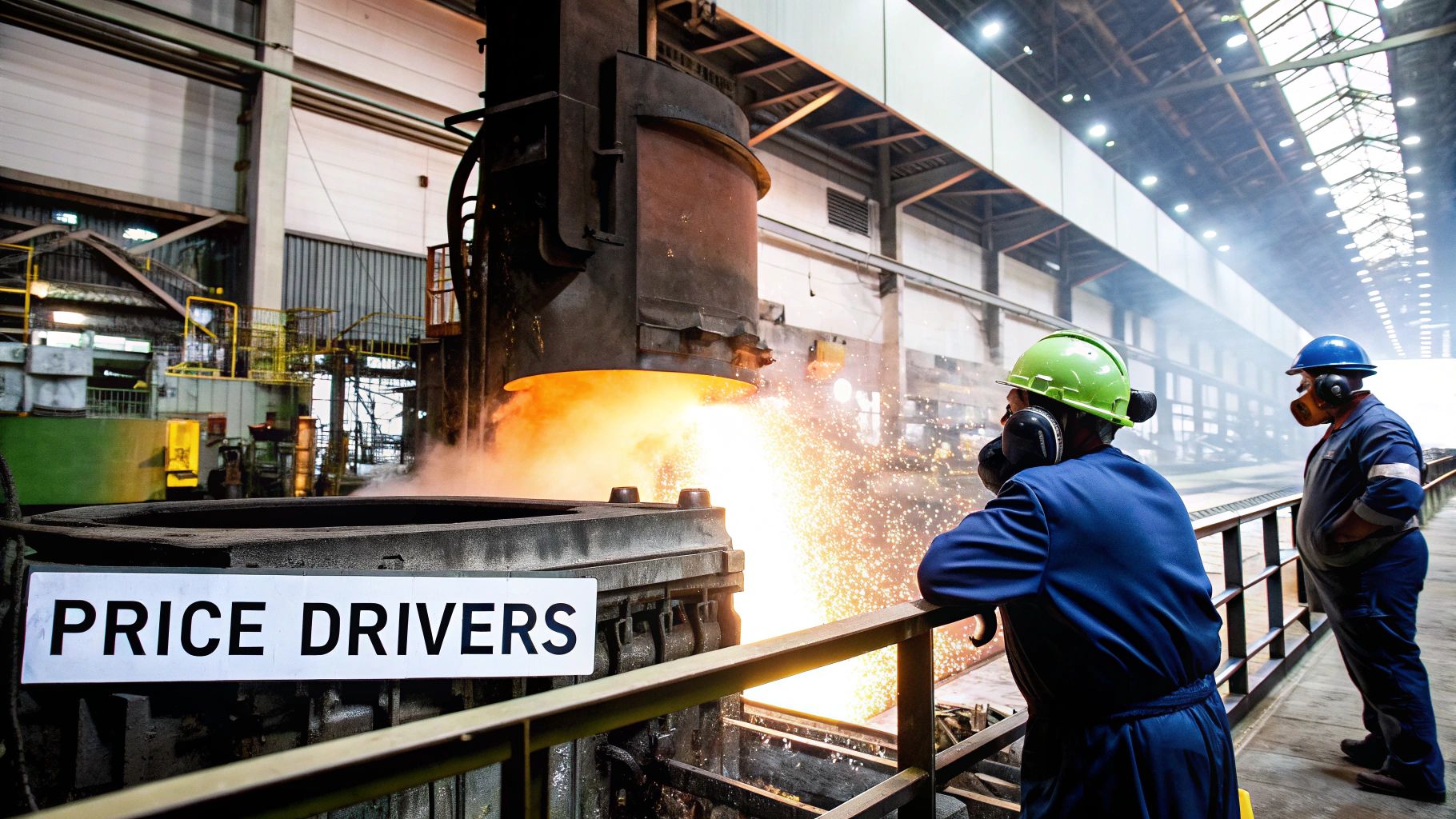
When most people think of a scrap yard, the image that comes to mind is towering piles of ferrous metal. These are the common magnetic metals – chiefly iron and steel – that form the skeleton of our world. We're talking about everything from old cars and washing machines to the massive girders that hold up buildings. They're the bread and butter of the scrap industry, and for good reason.
Getting your head around the different values within this category is the first real step to getting a better price. It’s not just a simple case of weighing it all in. A scrap yard sees more than just a pile of steel; they see distinct grades, and each one has its own price tag.
Just look at how the price of scrap metal per ton in the UK has bounced around recently. In 2023, for example, ferrous scrap started the year at roughly £110 per tonne. Strong demand from steel mills and other global factors pushed that figure up to a peak of around £140 per tonne by the summer, before it settled back down. This is exactly why keeping an eye on the market is so crucial. If you're interested in the nitty-gritty, you can dig into a more detailed 2023 ferrous scrap market analysis to see how these trends unfold.
From Light Iron to Heavy Steel
The most fundamental split that every scrap dealer makes is between 'light' and 'heavy' scrap. This isn't just jargon; it directly affects what you get paid.
-
Light Iron / Shearing Steel: This is your everyday, lower-density stuff. Think of the thin metal from an old dishwasher, flimsy shelving, or sheets of corrugated iron. Because it’s lighter and often mixed with more plastic, rubber, or insulation, it naturally commands a lower price.
-
Heavy Melting Steel (HMS): Now this is the good stuff. HMS is the premium grade of ferrous scrap and includes thick, solid items like I-beams, hefty machine parts, or thick-cut steel plates. It’s denser and cleaner, which means it consistently fetches a much better price per tonne.
Think of it like this: A scrap car shell is classed as light iron. Even though it's big, it's mostly thin steel panels, plastic bumpers, and interior fabrics. An I-beam from a demolished building, on the other hand, is almost pure, solid steel. That’s why the I-beam is far more valuable per tonne, even though both are technically steel.
Why Quality and Purity Matter So Much
At the end of the day, a scrap yard is a supplier. They're buying raw materials to sell on to steel mills, and those mills want one thing above all: clean, dense scrap that melts efficiently with as little waste as possible.
Anything that isn't metal – like dirt, concrete, plastic, or rubber – is a contaminant. It creates more work, produces more waste (or 'slag'), and ultimately lowers the quality of the new steel being produced. This is precisely why a well-sorted load of heavy steel from a demolition job will always be worth more than a jumbled pile of old household appliances.
By taking a bit of time to separate your heavy, clean metals from the lighter, more contaminated items, you're not just making the yard's job easier. You’re showing you understand what has value, which puts you in a much stronger position to get the best possible price for your material. A little bit of sorting goes a long way.
Decoding High-Value Non-Ferrous Metal Prices
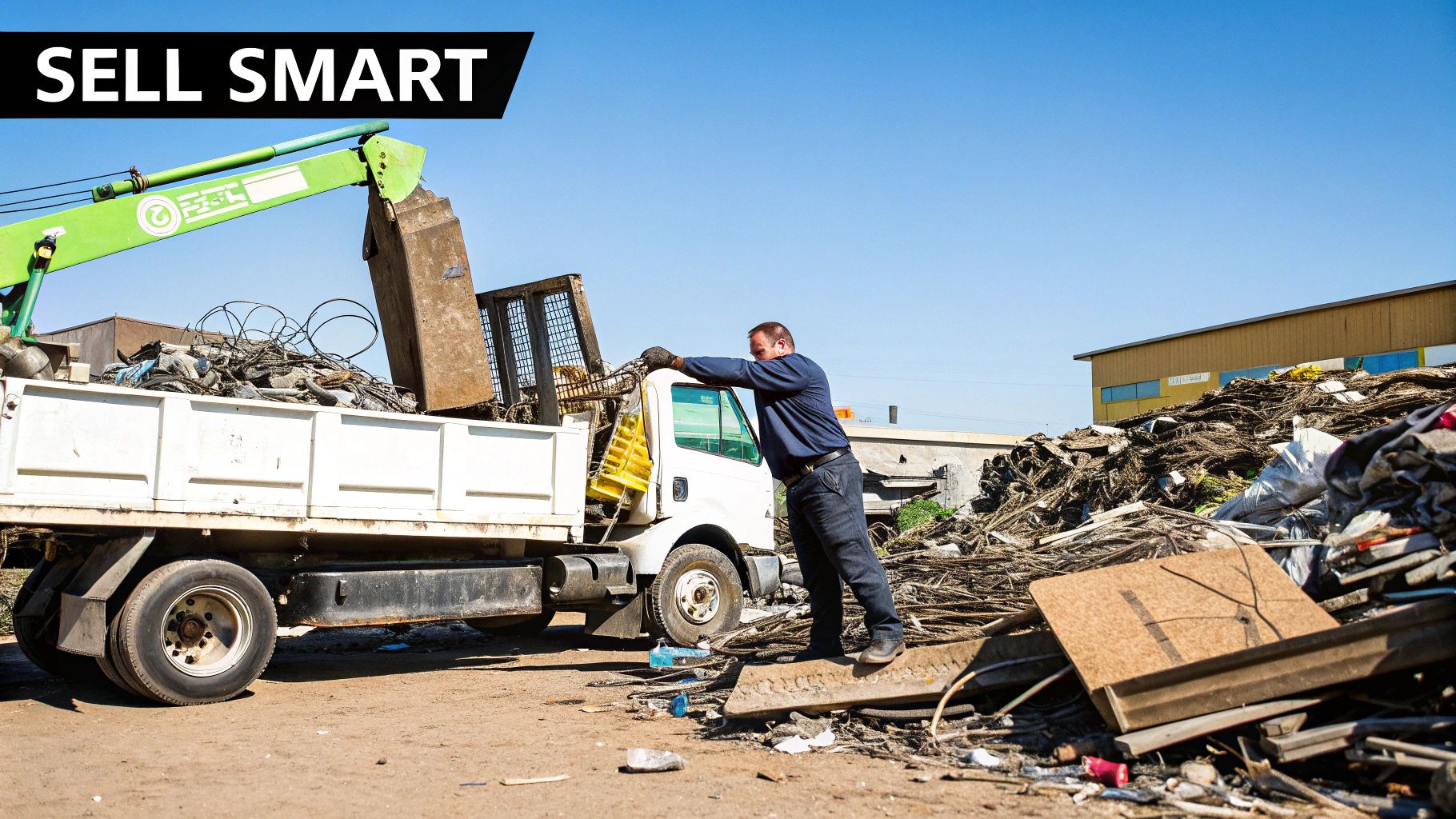
While steel and iron make up the sheer volume of what most scrap yards process, the real money is often found in the non-ferrous pile. Metals like copper, aluminium, and brass are where the high-value tickets are. Their impressive prices are directly linked to how vital they are for modern industry and technology.
If you want to significantly boost your profits, this is the category you need to understand.
These non-magnetic metals are everywhere. Copper is essential for pretty much anything electrical, from the wiring in your house to the circuit boards in your phone. Aluminium is prized for being both strong and light, making it a cornerstone of the aerospace and automotive industries, not to mention everyday things like drinks cans. This constant, critical demand is precisely why the price of scrap metal per ton UK for these materials towers over steel.
Just think about this: around 75% of all the aluminium ever produced is still in use today. That's a staggering statistic. It's possible because recycling it uses 95% less energy than making it from scratch. That huge energy saving is a powerful economic incentive that keeps the demand for scrap aluminium consistently strong.
Moving Beyond Simple Identification
Knowing that copper is valuable is a good start, but it's not enough. To really make the most of your scrap, you need to think like a scrap dealer and understand the different grades they look for. Just as with ferrous metals, it all comes down to quality and purity.
A yard in London or Surrey won't just give you a single price for "copper." They'll have a whole list of different rates depending on what you bring in.
To get the best price, you’ve got to learn to spot the difference between the common non-ferrous grades:
- Copper: There’s a world of difference between clean copper pipe (what dealers often call 'Bright & Shiny') and insulated copper wire. The pipe is clean, pure, and almost ready to be melted down. The wire, on the other hand, needs extra work to strip off the plastic insulation, and that extra labour cost lowers its initial value.
- Aluminium: Not all aluminium is created equal. Clean, extruded aluminium from old window frames will fetch a much better price than a bag of used drinks cans. That, in turn, is worth more than cast aluminium from an engine block, which is often contaminated with steel bolts and oil residue.
- Brass: This common alloy of copper and zinc is in all sorts of plumbing fittings, taps, and ornaments. Clean yellow brass gets a good price, but if it's still attached to steel or plastic parts, the yard will have to factor in the cost of removing them, dropping the price they can offer you.
The key takeaway is this: sorting is your most powerful tool. If you show up with a jumbled pile of mixed non-ferrous metals, the yard will price it based on the least valuable item in the mix. By taking a few extra minutes to separate your clean copper from your brass fittings and your aluminium, you ensure each metal is weighed and paid at its own, higher rate.
Getting good at this level of sorting is what separates the novices from the pros. It helps you spot the most valuable materials in any scrap pile and turns you from someone just getting rid of metal into a savvy supplier who understands what their collection is truly worth.
How Scrap Yards Work Out Your Payment
Ever wondered what actually happens when you turn up at the scrap yard? It's not just a case of throwing your metal on a pile and getting a handful of cash. There's a proper process to it, and understanding how it works is the key to figuring out how your final payment is calculated.
The first thing you'll do is drive your vehicle onto the weighbridge. Think of it as a giant, super-accurate set of scales for your car or van. They'll log this first weight – you, your vehicle, and all the scrap inside.
Once you’ve unloaded all your metal, you drive back onto the weighbridge. The difference between the first and second weight is the precise, undeniable tonnage of the scrap you’ve brought in. Simple as that.
Grading and Checking for Contamination
While your metal is being unloaded, an experienced grader is giving it a good look over. They’re essentially sizing it up, checking for the specific type and grade of metal, and—crucially—how much other stuff is mixed in with it.
It's a bit like selling a classic car; the book price is one thing, but the actual condition determines the final offer. For instance, a pile of clean, heavy steel is worth a lot more than light, rusty sheets tangled up with plastic and wood. Why? Because the yard has to pay someone to strip out all those contaminants before the metal can be melted down. That extra labour and disposal cost comes straight off your payment.
Key Takeaway: Every bit of non-metal material—dirt, rubber, plastic, you name it—will reduce your final payout. The cleaner your scrap, the better your price. It’s a golden rule.
The Legal Side of Getting Paid
The scrap metal trade in the UK is tightly regulated, and for good reason. Under the Scrap Metal Dealers Act 2013, yards are legally bound to check who you are. So, you'll always be asked for a valid photo ID (like a driving licence or passport) and a recent proof of address.
That same law also banned cash-in-hand payments. You'll be paid by a method that leaves a paper trail, usually a bank transfer or a cheque. This whole system was brought in to combat metal theft and make sure every transaction is above board. This applies to everything from a bucket of old copper pipes to a whole car. If you're scrapping a vehicle, you can get a more detailed breakdown of how much to scrap my car and the specific documents you'll need.
How to Get the Best Scrap Metal Prices
Turning a pile of old metal into a decent payday is more of an art than you might think. While huge global markets set the baseline price, what you do on the ground can make a massive difference to the cash you walk away with. This is how you go from being just another seller to a smart trader who gets the best possible price for every load.
The single most important thing you can do—and the one that adds the most pounds to your pocket—is to sort your metals properly. If you show up with a jumbled heap of everything, a scrap yard will always pay you based on the least valuable metal in the pile. It’s their safety net. By simply separating your high-value non-ferrous metals (like copper and aluminium) from the common ferrous ones (iron and steel), you get paid the correct, higher rate for each.
Once you’ve sorted your metals, the next step is making sure they’re clean.
Why Clean Scrap Fetches a Premium
Think of it from the scrap yard's perspective. They aren't just hoarding metal; they're preparing a specific raw material that will be sold on to steel mills and foundries. Anything that isn't metal—plastic, rubber, wood, fabric, even caked-on dirt—is a contaminant. It all has to be stripped off before the metal can be melted down, which costs the yard time and money.
That cost gets passed directly back to you as a lower price per ton. It’s why a clean, well-sorted pile of heavy steel will always fetch a better price than a jumbled collection of old washing machines and microwaves. A few minutes spent stripping wires or pulling plastic casings off can genuinely boost your final payout.
The Power of Volume and Shopping Around
When it comes to scrap, bigger is usually better. A dealer will almost always be more interested in a larger, well-sorted load. It’s far more efficient for them to handle one big transaction than dozens of tiny ones, and they'll often offer a better rate per ton to encourage it. If you have the storage space, it can pay to build up your collection before heading to the yard.
Finally, never, ever take the first price you're offered. The price of scrap metal per ton in the UK can vary significantly from one dealer to another, even within the same town. A yard in a city centre will have different overheads and demands than one on an industrial estate in Birmingham or Slough. Make a habit of calling at least two or three local yards for a quote before you even think about loading your vehicle.
For anyone scrapping a whole vehicle, knowing these details is especially important. We cover this in-depth in our complete guide on how to scrap your car.
Frequently Asked Questions About Scrap Metal Prices
Diving into the scrap metal world can feel a bit confusing, and it’s natural to have questions about how it all works, especially when it comes to getting paid. We hear a lot of the same queries from people across London, Surrey, and the surrounding areas, so we've put together some straight answers.
Think of this as your quick-reference guide to make sure you're getting the best possible price of scrap metal per ton in the UK.
Why Is My Local Yard Price Different From Online Averages?
It’s a great question. Those online prices you see are usually broad national or even global averages. They're a useful starting point, but they don't reflect what’s happening on the ground in your specific area.
Your local dealer in London or Surrey has to factor in their own costs—things like transport to the larger processing plants, their day-to-day operating expenses, and the real-time demand in your local market. For a price you can actually bank on, your best bet is always to call them directly.
Can I Get Paid in Cash for My Scrap Metal?
Simply put, no. It’s actually illegal for any UK scrap dealer to pay you in cash. The government brought in the Scrap Metal Dealers Act of 2013 to crack down on metal theft by making sure every transaction is traceable.
You'll need to show a valid photo ID, and your payment will come through a bank transfer or a cheque. It’s a rule that protects both you and the yard.
Is It Really Worth My Time to Separate Metals?
Yes, one hundred percent. If there’s one thing you do to get more money for your scrap, make it this.
If you just turn up with a mixed jumble of metals, the yard has to pay you for the whole lot based on its least valuable component, which is usually cheap light iron. Taking a few minutes to pull out your valuable copper and aluminium from the less valuable steel means each metal is weighed and priced correctly. It makes a huge difference to your final payout.
What Is the Process for Scrapping a Car?
You can’t just take an old car to any scrap yard; you have to use an Authorised Treatment Facility (ATF). This is a legal requirement in the UK.
They'll weigh your car to work out its scrap value and, just as importantly, they will handle all the official DVLA paperwork. The crucial document you'll receive is the Certificate of Destruction (CoD). This is your official proof that the vehicle has been legally and permanently taken off the road.
You can find answers to other common questions in our scrap car FAQ.
For a guaranteed fair price and a completely hassle-free experience scrapping your car in London, Reading, Slough, and all of Berkshire, Hertfordshire, Buckinghamshire, and Surrey, trust the experts at Fast Scrap Car. We offer instant quotes, free same-day collection, and immediate payment. Get your quote today at https://fastscrapcar.co.uk.
